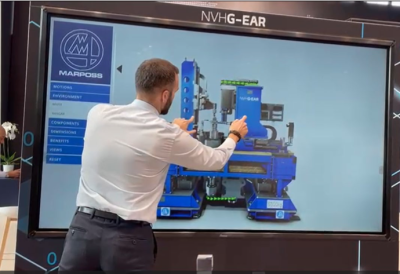
Marposs' NVH G-EAR testing system uses a virtual tool that allows users to explore every aspect of the machine. Featuring a large format touchscreen, users can interact with the machine as it is running through an inspection cycle, allowing them to dynamically navigate through the machine, change its angle and cycle, as well as other commands. Additionally, an interactive roll-over menu enables users to select areas of the machine where they would like further information regarding features a technical information. This level of interactivity helps to clearly explain the NVH G-EAR system process and capability.
The NVH G-EAR system can identify potential gear defects at the component level prior to gear box assembly. It works on the Single Flank testing principle where one master gear meshes with the component under inspection, detecting macro-geometry (nicks, runout etc.) and micro- geometry (gear mesh excitation, ghost orders) defects that cause gear whine and noise phenomena.
Hybrid (HEV) and full electric vehicles (EV) drivetrains can be challenged by increased NVH requirements in high-speed e-Drives. And, although the number of gear wheels is significantly reduced in electric vehicles -- due to the use of one or two-speed reducers instead of the classic manual, automatic or twin-clutch gear boxes – these gear wheels are loaded with torque and rpm not previously found in high-volume production.
With hybrids and EVs, the noise from an internal combustion engine ICE is intermittent or non- existent, so that transmission makes the most dominant vehicle noise. Noise, therefore, becomes not only a mechanical issue for the performance of the transmission, but also
a comfort issue for the driver.
Basically, the concept of the NVH G-EAR tester is to stress the gears by applying rotational speeds and torque values similar to those that are applied in real world conditions. The ability to test gears at stressed conditions, replicating the gear behavior in the final e-Drive is a main benefit of this system.
Specifications
The output parameter is the angular acceleration of the part (or master), evaluated instantaneously and in the long run with the use of encoders (TE inspection) and torsional accelerometer (TAC inspection). The stiff granite structure of the NVH gear tester makes it impervious to external interferences and highly configurable software makes this system as good as correlating data with the End Of Line test rig.
The NVH G-EAR tester has a max rotating speed of 3000 rpm, driving torque of 0 – 30 Nm, and can accommodate a max gear tooth height of 70mm and shaft length of 350mm. It can be designed to work with either manual or automatic loading.








